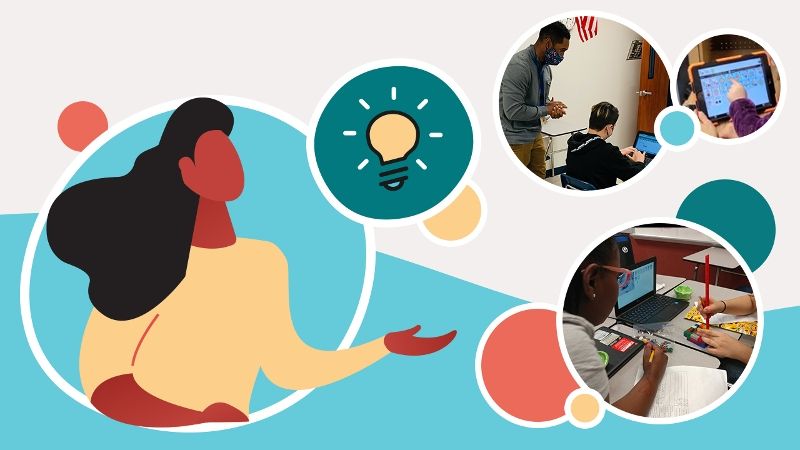Engage Families in Assessment Practices
Family engagement is critical for creating equitable assessment experiences. Because families understand their student’s strengths best, they are a valuable source of information to determine appropriate assessments and assessment accommodations. Read on to learn more about how district leaders and educators can include families in assessment efforts.
Include Families in Accommodation Decisions
Practice: Educators include families as partners in decision-making for assessment accommodations.
Actions that lead to including families in accommodations decisions include:
- Engage families in alignment of accommodations: Engage families in decision-making to identify and align instructional and assessment accommodations.
- Provide information on universal supports: Provide families with information and training on available supports for statewide and classroom universal tools provided to all learners.
- Provide information on accommodations: Provide families with information and training on available supports for statewide and classroom accommodations available for children and youth with disabilities.
Include Families in Decisions Related to Standardized Assessment
Practice: Include families in decisions related to state and district standardized assessments.
Actions that lead to including families in decisions related to standardized assessments include:
- Include families in assessment planning: Equitably include families of children and youth with disabilities in standardized assessment selection, implementation planning, and alternative options.
- Inform families of how data are used: Share with families how large-scale assessment data are used.
Include Families in Data-Based Decisions
Practice: District leaders and educators include families as partners in data-informed decision-making.
Actions that lead to including families in instructional and transition decisions include:
- Communicate data to families: Communicate assessment data to all families in an understandable format.
- Use a convergence of data: Use a convergence of data to make well-informed instructional and transition decisions (e.g., standardized assessment, formative assessment, behavior data, screening data, etc.) for all learners.
Actions for district leaders to include families in programmatic and systemic decisions:
- Engage families in programmatic change: Give families the opportunity to provide input on programmatic decisions stemming from data analysis.
- Engage families in systemic change: Give families the opportunity to provide input on systemic decisions.
Learn From Our Partners

- Podcast: S02, Ep.03: Family Engagement & Inclusive Technology Practicesexternal site, National Center on Accessible Educational Materials at CAST
- Webinar: Partnering with Families in the Digital Learning Processexternal site, CITES at CAST with the Center on Parent Information & Resources (CPIR)
- Case Story: Jenks Public Schools ⎜Jenks, OK
Resources
- Empowering Families Toolkitexternal site, National Center on Educational Outcomes (NCEO)
- Family Engagement Resources for Assessmentexternal site, Center for Parent Information & Resources
- Suggestions for Involving Students in Selecting and Implementing Accommodationsexternal site, National Center on Educational Outcomes
- Moving Your Numbers: Using Assessment and Accountability to Increase Performance for Students with Disabilities as Part of District-wide Improvementexternal site, National Center on Educational Outcomes
Harsha's Story
Harsha is an assistive technology specialist in an urban school district in a South Atlantic state. At the end of each school year, she works with teachers to ensure that accommodations are in place for students on end-of-year state assessments.
Nikola is a middle school student with low vision caused by a degenerative eye condition. Since Nikola has low vision, her 504 plan accommodates large print materials, a screen magnifier, and audiobooks.
On last year’s state assessments, Harsha ensured that there was a screen magnifier on the testing device and that Nikola was provided with breaks as needed for eye fatigue. Due to frequent breaks, Nikola took 2 hours longer than other students to complete the assessment.
When exams were over, Harsha sent an email to the families of students that she serves asking for feedback. The response from Nikola’s father, who has the same eye condition as Nikola and is blind, caught her attention.
“Nikola received adequate accommodations and completed the assessments independently. However, I am concerned about the time it took for Nikola to take the assessments. She was so tired after the day of testing that she missed her dance class that night. If Nikola had a braille version of the assessment, she could complete it without eye fatigue or breaks.”
Harsha reflected on this feedback. She realized that including family members earlier in the assessment process might lead to improved test experiences. Harsha decided to make the following changes:
- In IEP and 504 planning meetings, she asks family members and students, “What accommodations would you like to have the best possible assessment experience?”
- She invited Nikola’s father and other family members of students that she serves to the state assessment accessibility workshop to help inform systemic improvements.
Research
- Clancy, M., & Gardner, J. (2017). Using digital portfolios to develop non-traditional domains in special education settings. International Journal of EPortfolio, 7(1), 93–100.
- Larson, E. D., Thurlow, M. L., Lazarus, S. S., & Liu, K. K. (2019). Paradigm shifts in states’ assessment accessibility policies: Addressing challenges in implementation. Journal of Disability Policy Studies, 30(4), 244–252. https://doi.org/10.1177/1044207319848071external site
- McWilliams, L. & Patton, C. (2015). How to share data with families. Education Leadership., 73(3). 46-49.
- United Nations Educational, Scientific and Cultural Organization (UNESCO). (2019). The promise of large-scale learning assessments: Acknowledging limits to unlock opportunities. UNESCO. https://unesdoc.unesco.org/ark:/48223/pf0000369697external site
